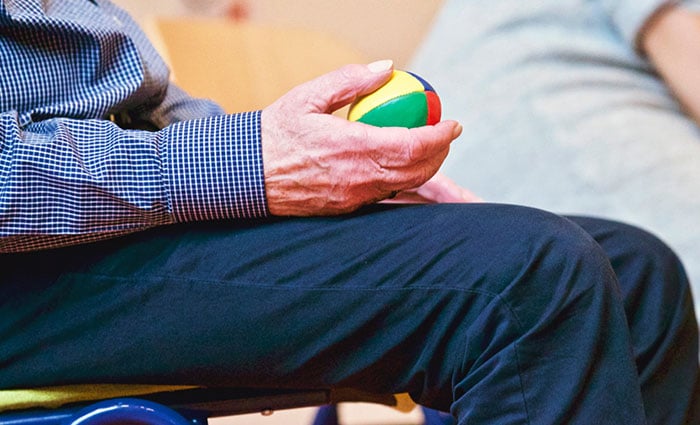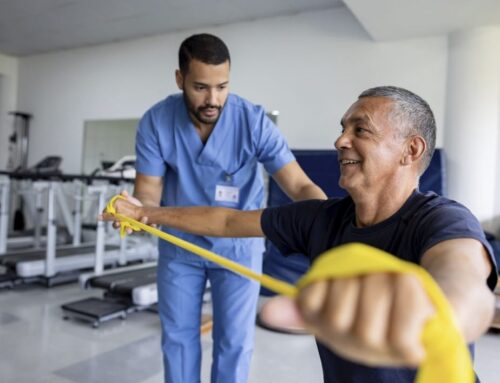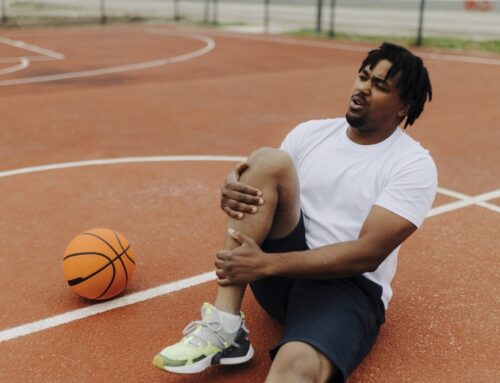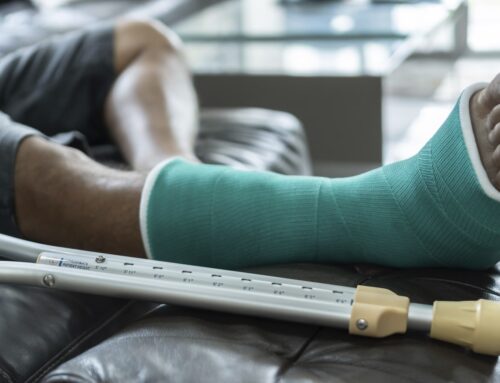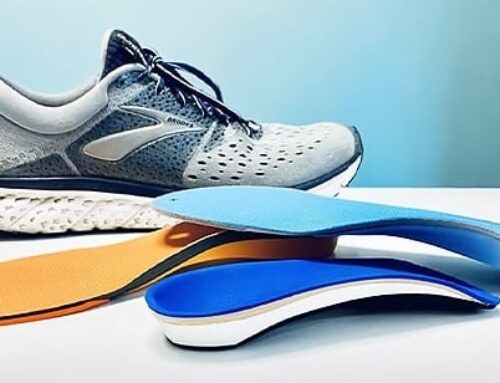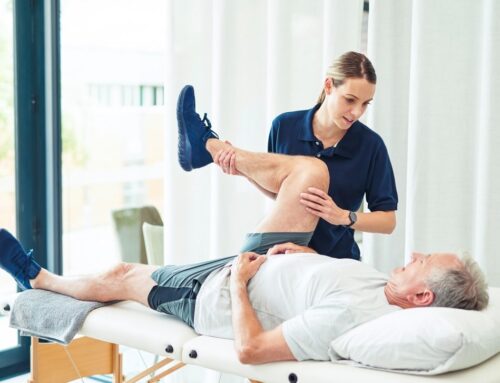April is Occupational Therapy Month. Cary Orthopaedics is celebrating by discussing the benefits of occupational therapy and spotlighting a few of our talented clinicians.
Occupational therapy (OT) helps people develop or regain skills for independent daily living. Therapists work with people of all ages who have a limiting condition, disability or injury that prevents them from accomplishing everyday tasks.
The occupational therapist assesses the patient and develops a plan specifically focused on the patient’s needs. These needs often center around developing fine motor skills, visual perception, sensory processing and cognitive thinking skills.
Therapies involve strengthening the patients’ abilities to feed themselves, get dressed and perform daily tasks. The goal is to enable them to live as independently as possible. Occupational therapists often incorporate adaptive equipment or environmental modifications to help the patient succeed.
Learn more in our blog: What is Occupational Therapy?
Is occupational therapy the same as physical therapy?
People often do not understand occupational therapy and its goals. As explained above, occupational therapy focuses on helping patients regain the ability to perform activities of daily living. Physical therapy is different. It aims to improve a patient’s strength and mobility, help them manage joint pain or help them recover after surgery.
Physical therapy and occupational therapy sometimes have similar goals but utilize different methods to achieve them.
All PTs and OTs at Cary Ortho are listed under the Physical Therapist provider tab on our website for a streamlined user experience.
Cary Orthopaedics’ expert occupational therapists
Cary Orthopaedics has an excellent team of occupational therapists who treat patients at all our facilities except the Spine Center. Meet a few of our therapists:
Melissa Clark, OTR/L, CHT, joined Cary Orthopaedics in 2017 and sees patients at the Cary Parkway location. She is a certified hand specialist (CHT) with more than a dozen years of experience.
Sarah Rahman, OTR/L, CHT, joined our staff in 2019 and also works at the Cary Parkway location. She is a certified hand specialist (CHT) and a faculty member and didactic instructor for the OrthoCarolina Residency program.
Julie Dubas, OTR/L, CHT joined Cary Ortho in 2021 and sees patients at the Holly Springs location. She is a certified hand specialist (CHT) and a certified ergonomic assessment specialist.
We asked these experienced providers to answer questions about the benefits of occupational therapy and to describe their work:
What type of patients do occupational therapists treat at Cary Ortho?
Clark: “We see the majority of our patients post-operatively. The diagnoses vary, but patients usually [have had surgery] due to trauma, like tendon lacerations and repairs or fractures. We also see a large [number] of patients after surgery like joint replacement for arthritic changes.”
Rahman: “I treat patients with injuries or limitations to their [arm, hand, forearm, shoulder, elbow or wrist], whether post-op or conservative.”
Dubas: “We treat people of all ages who have fractures, nerve dysfunction (like carpal and cubital tunnel syndrome), arthritis (post-surgical and conservative exercises), tendonitis (tennis and golfer elbow, DeQuervain in the thumb), tendon injuries (flexor and extensor tendon lacerations) and amputations.”
What are the benefits of occupational therapy in helping patients get back to everyday life?
Occupational therapy is essential for some patients to return to their everyday lives. Therapists analyze the patient’s full range of needs and current situation, then build a treatment plan that best helps them reach their goals.
Occupational therapy benefits patients in many ways, according to our therapists:
Rahman: “Occupation therapy deals with the occupation of life. Think about reaching out for a cup of water, picking up your kiddos, doing your job/hobbies or hugging your loved ones. You need the ability to move (range of motion). You also need the strength, coordination and level of comfort to do those tasks. As occupational therapists, we work with you to address these areas to get you back to what is important to you.”
Daniel Schneider, a former patient of Sarah Rahman, found this to be true following a biking accident. Schneider broke both of his elbows, had surgery and then chose to do occupational therapy and rehabilitation at Cary Orthopaedics. Read his story here.
Dubas: “We use a variety of treatments that improve range of movement, strength and coordination. All these aspects are important for performing tasks in daily life. Often, we use exercises that simulate difficult activities for patients. We start at a challenging but attainable level, then gradually increase the difficulty until [the patient] can perform the activity successfully.”
“[Our occupational therapy team] also provides education on how to modify activities and use adaptive devices. We sometimes also splint patients to assist with their functional goals.”
Our team employs various therapies to help patients obtain the best outcomes and occupational therapy benefits.
Why did you become an occupational therapist?
Clark: “I became an occupational therapist because I enjoy working with people. I also enjoy the challenge of the upper extremity (arm, shoulder, elbow, wrist and hand), its complexity and making custom orthotics.”
Rahman: “I became an occupational therapist because I was once sitting where my patients sit. I know how much a hand or upper extremity injury can affect one’s life. Every story is different, but I understand how humbling and frustrating an injury can be. I love that I get to help and be a part of a journey to increase independence and quality of life.”
Dubas: “I decided to become an OT to help people struggling to use their arms to gain or regain the ability to do what they want. No one realizes how difficult it is to do something until you can’t use your finger, hand, wrist or elbow.”
What is your favorite aspect of being an occupational therapist?
Clark: “Developing patient rapport and seeing the patient progress over the course of their therapy is very fulfilling. I love to watch how it affects [the patient’s] life. I also enjoy working directly with the doctors and surgeons, which provides the opportunity for continued growth and challenge.”
Rahman: “My favorite part of [being an occupational therapist] is when a patient walks in excited that they were able to do or complete something that they have been diligently working on. I love that!”
Dubas: “Seeing progress in [my patients’ ability to] function is my favorite aspect of occupational therapy. I love it when a patient comes in and excitedly says, ‘I was able to do a task today!’”
Why do you think a patient should choose Cary Ortho for OT?
Clark: “Our occupational therapy team at Cary Ortho sets us apart from other clinics. We have an excellent program. We work hard to ensure our patients’ experiences and interactions with all staff from the moment they walk in until they leave the clinic are exceptional.”
Rahman: “There are many benefits of occupational therapy at Cary Orthopaedics. First, we love what we do and it shows. I feel that if you truly love what you do, the service you provide will be of the highest quality.”
“Our team is knowledgeable and holds certifications. We use evidence-based practice to guide our therapeutic process. We also value great communication with both doctors and patients for good continuity of care.”
Dubas: “We have therapists who are highly experienced in orthopedics and provide therapy based on research and evidence to prove that it is helpful. The OTs also provide one-on-one treatment, ensuring each patient receives the best quality of care.”
Cary Orthopaedics is a top-rated orthopedic practice composed of talented and supportive medical professionals. We emphasize high-quality orthopedic care, close interprofessional communication and advanced certifications.
Want to learn more about occupational therapy? Read the blog: Debunking Occupational Therapy Myths
Occupational therapy in Raleigh, Cary, Morrisville, Holly Springs
Should you or a loved one have a disability or sustain an orthopedic injury that prevents you from performing daily activities, Cary Orthopaedics is a great place to turn. Our occupational specialists help patients learn new ways to move and regain strength. Get back to to school, work and everyday life with our help.
Occupational therapy is part of the Cary Orthopaedics Physical Therapy department. Contact us to make an appointment today.

